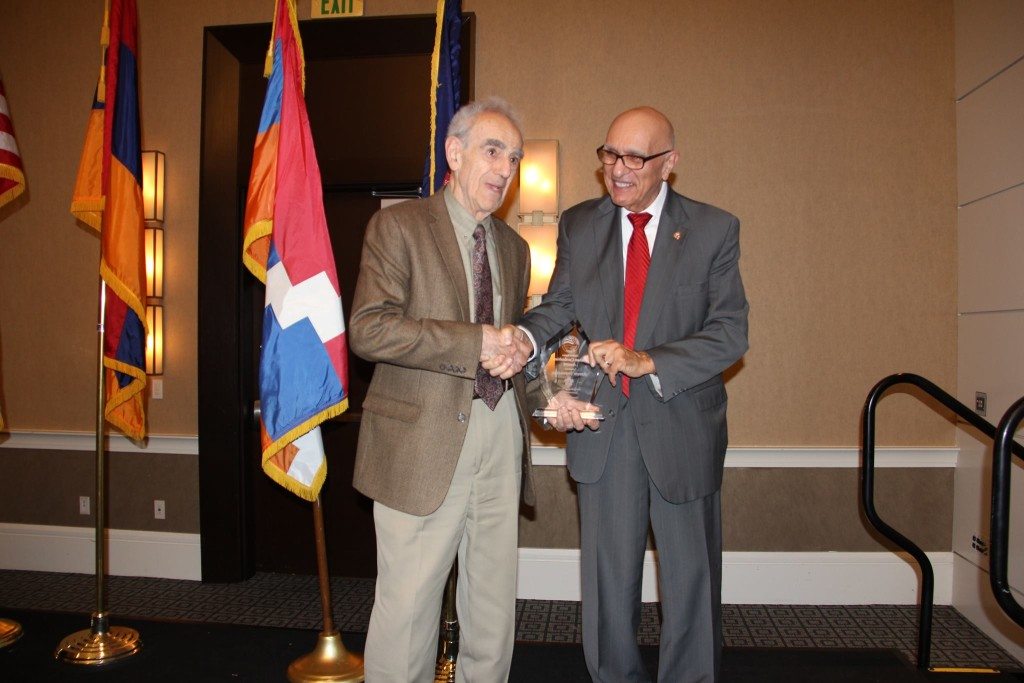By Ned Apigian, on behalf of the Detroit ARF Azadamard Gomideh
The Detroit Armenian Revolutionary Federation (ARF) Azadamard gomideyutiun (ARF branch) and the community lost Armenag Topouzian—one of our most influential members of the last half century—on Aug. 24.
At 88, Armen was the oldest member of the gomideyutiun; he was also the most respected and important, and we looked up to him. During much of his long years of quiet leadership, his ideas were viewed as the most appropriate and valid, and were adopted as policies nearly without exception. Accordingly, the present gomideh (ARF executive) asked me to represent it and all our ungers (comrades/ARF members) with an appropriate statement in his memory.
Armen Topouzian was born in Massena, N.Y, where he was a very active Armenian Youth Federation (AYF) member. He was an athletic standout while a member of the Utica N.Y. AYF chapter, and he was selected an AYF Olympic King during the 1961 Olympic Games in Detroit.
Armen graduated from Rensselaer Polytechnic Institute in Troy, N.Y, in 1951, with a bachelor’s in science in mechanical engineering. He later earned a master’s degree in mechanical engineering from Wayne State University, Detroit, in 1958.
In 1955, while still in the U.S. Army, he married the love of his life, Norma (Yacoubian) Ardash, of Detroit. Upon his discharge, they started their family and had sons: Keri (Rita), Daron (Simone), and Ara (Della). Unfortunately, Norma passed away in 1993, never knowing her 10 grandchildren and leaving Armen a widower for his last 24 years.
Armen retired from the Ford Motor Company after 30 years of service as the manager of the Engine Engineering and Turbine Research Group, where he oversaw 140 research engineers and where he developed 36 patents for the company.
Armen’s ARF activity began in Detroit, in 1967, with the establishment of the Woodrow Wilson gomideyutiun; he shaped its method of operation after his personal character—and it was an ideal character for an ARF member. Upon the combining of the separate ARF groups into one in the late 1970s, Armen was recognized as an important leader of both the ARF and the Armenian community until, due to his illness, about four years ago.
Armen was most respected among us because of his personal ethic of hard work. Many leaders lead by encouraging others to do. Armen was a doer: He led by example, and as a result he always swayed the rest of us to his ideas by his quiet sense of total commitment.
While acting as the local elected leader among us in Detroit, he was involved in several national and international Armenian projects simultaneously.
After the 1988 earthquake in Armenia, he located surplus medical supplies from local sources for shipment to Armenia. During the Karabagh (Artsakh) war in the early 1990s, he was involved with several other Armenian engineers and financial benefactors in raising money and providing technical and scientific solutions to help in the war effort with their expertise. For the Armenian Relief Society (ARS) prenatal facility in Artstakh, he secured dozens of hospital beds that he had to find a place to store until they could be shipped to Armenia on the monthly Kirk Kerkorian (United Armenian Fund) air flights. Because of all those and other projects, he made 30-plus trips to Armenia in 15 years, raising more than two million dollars in the process. The construction of the 13 ARS kindergartens and his hotel project in Artsakh took more effort still.
Accordingly, as a result of those activities, Topouzian was awarded a Testimonial of Appreciation by the ARS in 2005. In 2012 he was presented with the Agnouni Award at the ARS Eastern Region Convention. Then, in 2015, for his lifetime of Hai Tahd work, he received the Cardashian Award from the Armenian National Committee of America (ANCA) Eastern Region Board of Directors at the annual Banquet, hen held in Detroit that year. Much to my surprise, on that day he actually stood up and spoke, which was very unlike him.
Character is everything in a leader, and Armen’s character was special. He was quiet—almost invisible—and never raised his voice, rarely argued, and always had a smile on his face. He never was the speaker of a program or the usual master of ceremonies of our events. I cannot even remember that he sat at a head table; it was not his style. He had the character of the ideal ARF leader. No matter the function—church, political, or secular—he was, however, always seated with the Srpazan (prelate) or the invited guest speaker at the table with the der hayrs (priests).
Armen was not a wealthy man, but he was a very successful person who was more than personally comfortable and was very generous in his many donations to Armenian projects he was directly involved in.
For me, Armen was like the older brother I never had, and he treated me like the younger brother he never had. He never had an unkind word to say, and was always encouraging and respectful to me. In short, he was my psychological “shield.”
Together in the ARF we could make a fist, where he was the thumb, the opposing digit that locks the remaining individual fingers together into the collective strength of a fist.
His loss is a great personal loss for me, and a collective loss for the entire ARF community of metropolitan Detroit.
The post In Memory of Armenag Topouzian, an Exemplary ARF Leader appeared first on The Armenian Weekly.
Source: Armenian Weekly
Link: In Memory of Armenag Topouzian, an Exemplary ARF Leader


